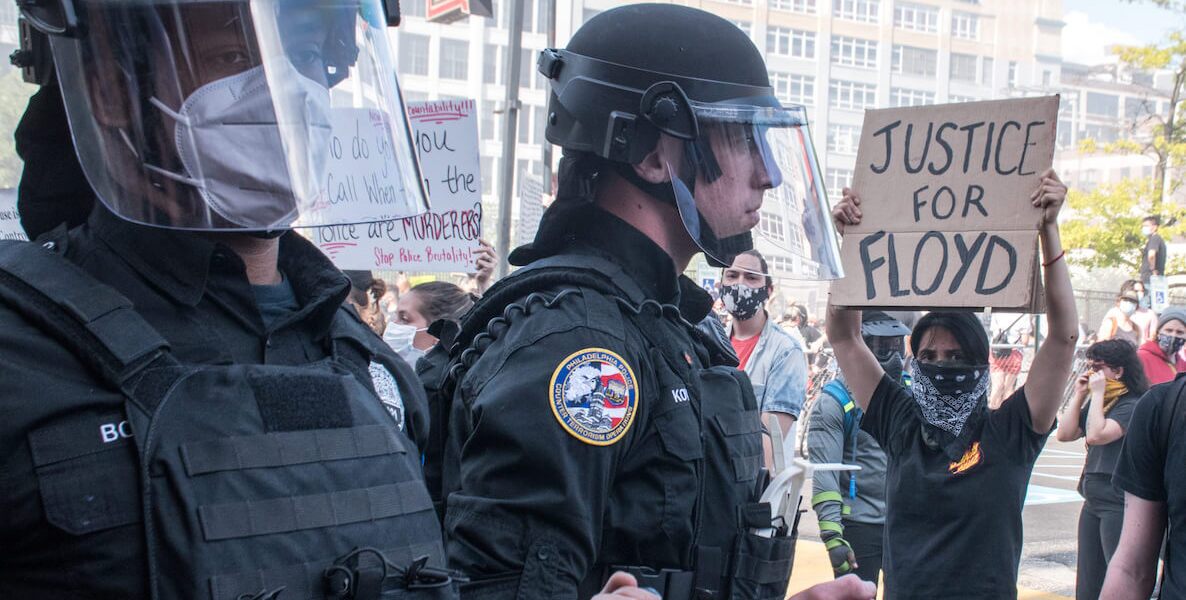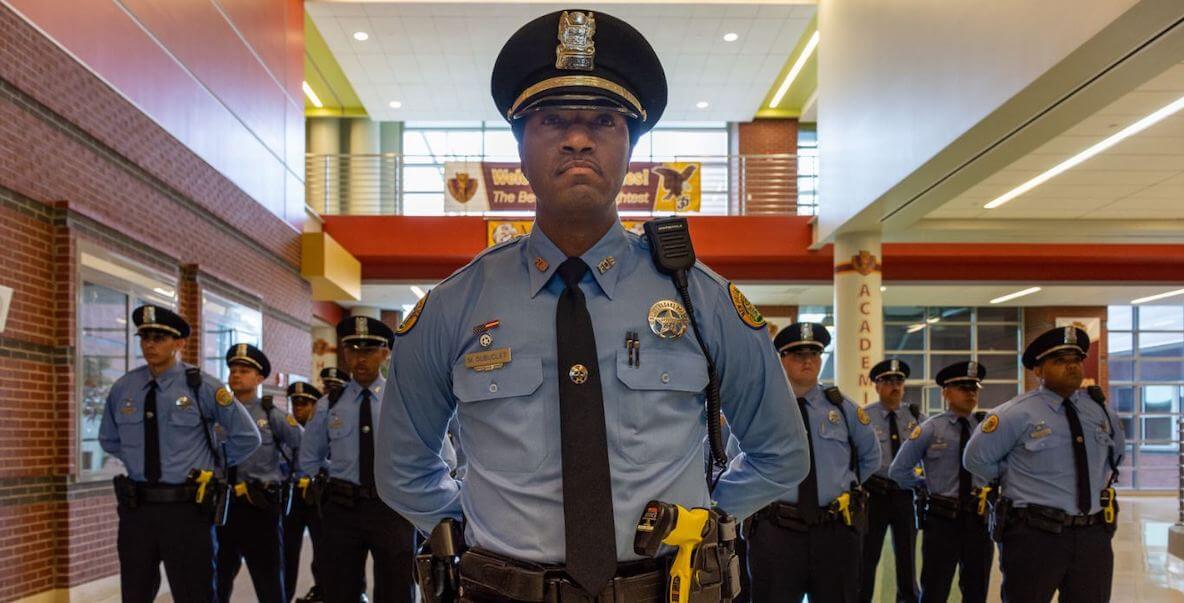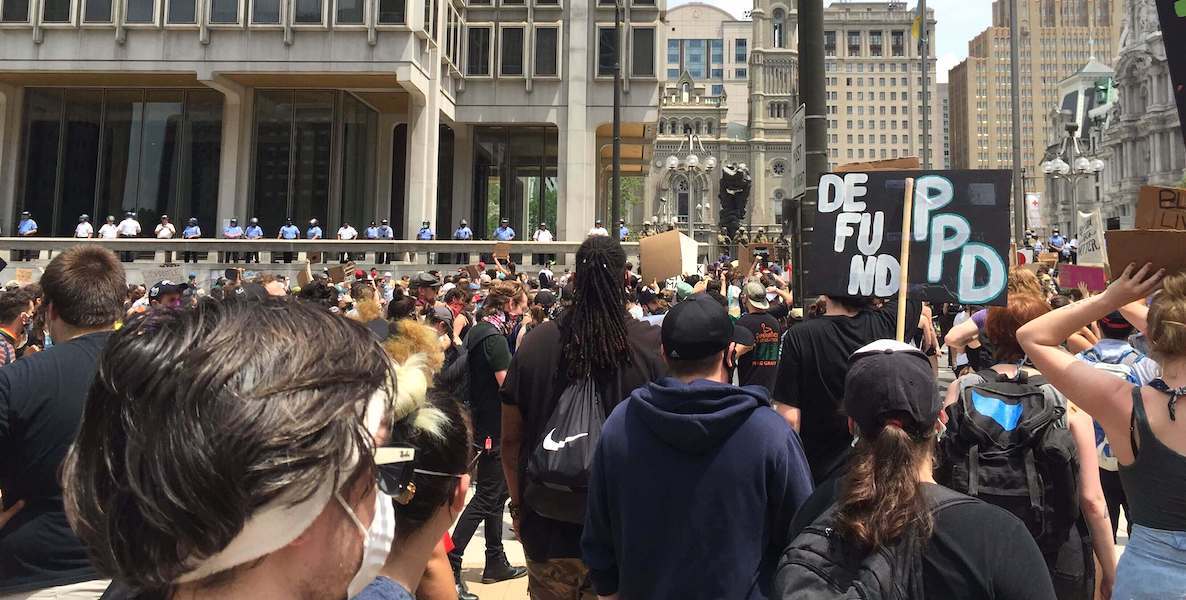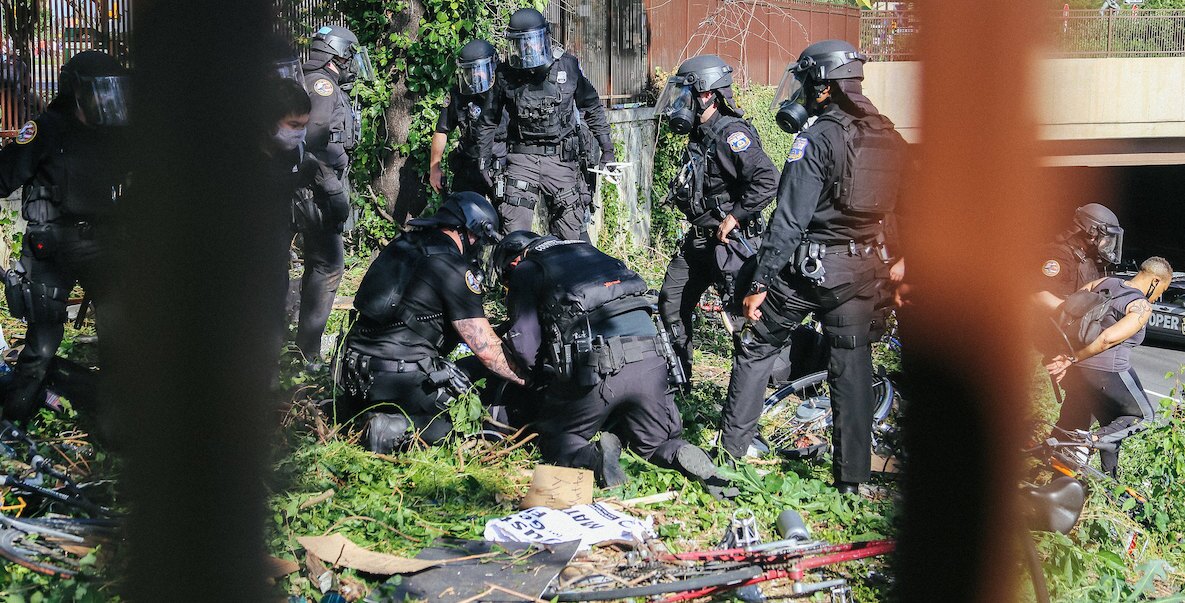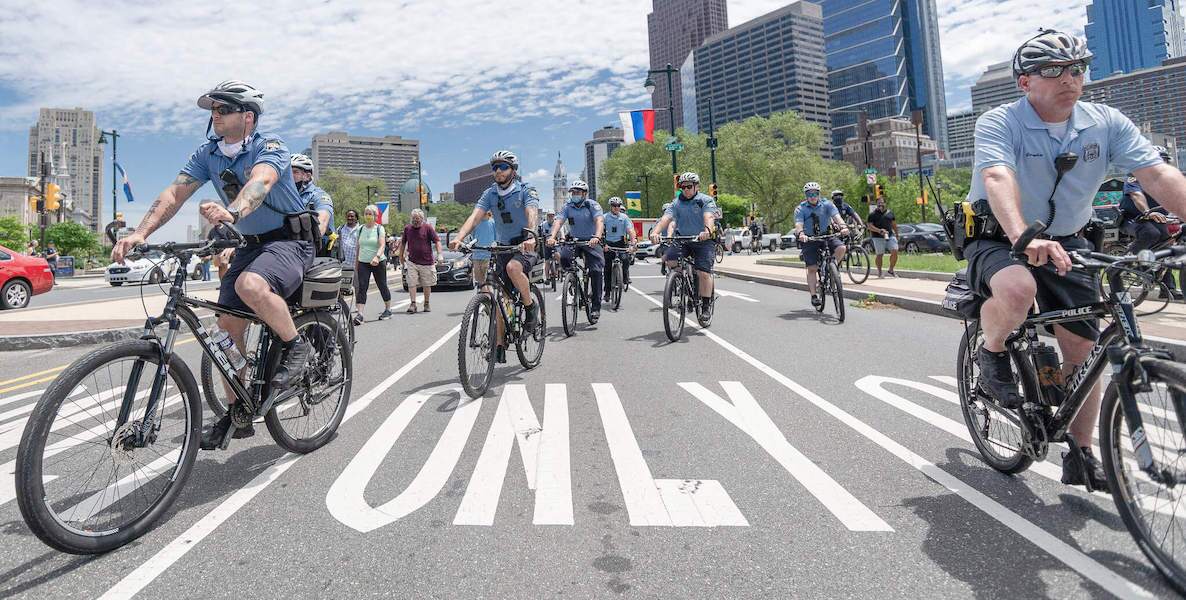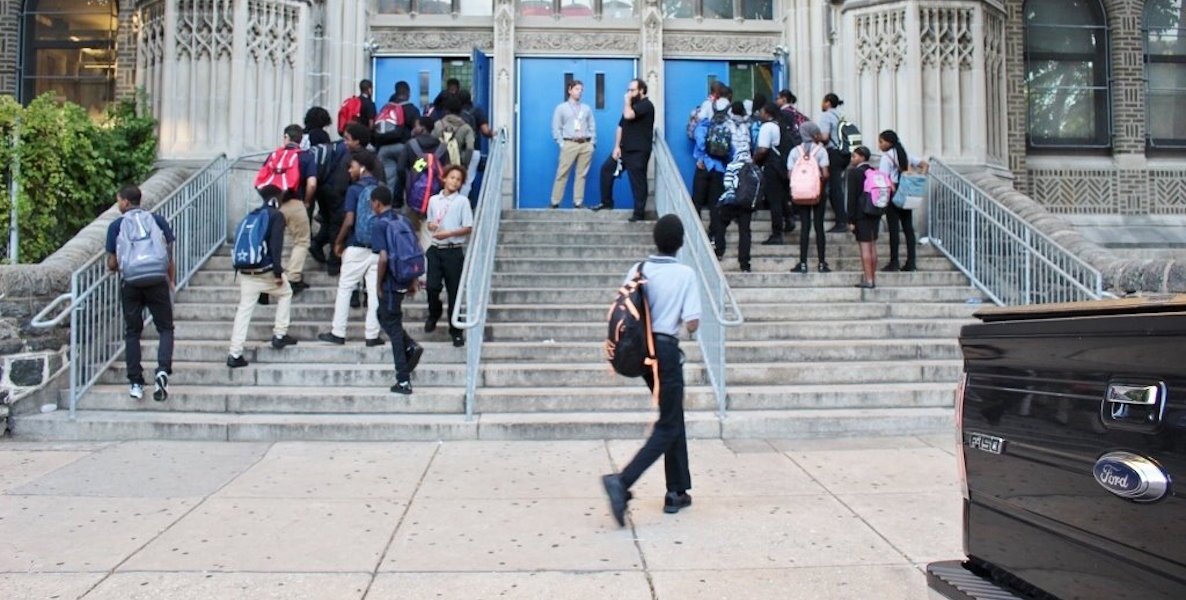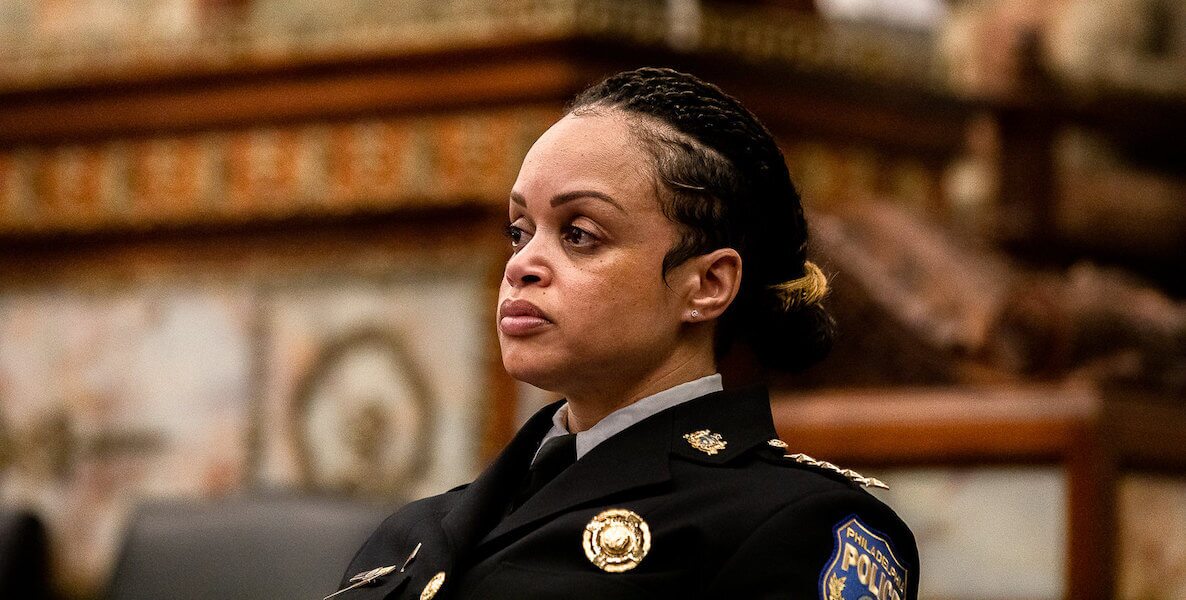![]() Earlier this week, I called Police Commissioner Danielle Outlaw to apologize. Last week, you see, in my article about Mayor Kenney’s leadership in times of crisis, I dismissed Outlaw’s Crime Prevention & Violence Reduction Action Plan, released in late June, as “not-so inspiring,” and criticized its lack of accessibility.
Earlier this week, I called Police Commissioner Danielle Outlaw to apologize. Last week, you see, in my article about Mayor Kenney’s leadership in times of crisis, I dismissed Outlaw’s Crime Prevention & Violence Reduction Action Plan, released in late June, as “not-so inspiring,” and criticized its lack of accessibility.
It’s easier to find a press release about it on the police department website than it is to find it; It has no presence on the home page and is buried, instead, in the PPD’s Accountability vertical.
Here’s the thing, though. I’ve gotta keep it real with you, even if it makes me look like a smacked ass. Prior to writing those words, I hadn’t actually read the plan. I had read the preamble outlining the plan’s “pillars”—organizational excellence, crime prevention and violence reduction, and community engagement and inclusion—and thought I recognized an all-too-familiar strain of consultant-speak.
And my cynicism was probably reinforced when the press coverage around Outlaw’s plan seemed to hone in on its new spirit of cooperation between PPD and the District Attorney’s Office. A good thing, indeed, but not something that exactly advertises a new, innovative public safety strategy.
![]() Well, last weekend, I read the full 37-page plan, and found it to be chock full of the type of innovative best-practices we’ve been chronicling—and championing—at The Citizen. I’m not being glib in copping to my failure here; by pronouncing a verdict on Outlaw’s plan, born of ignorance, I did what we often rail against in the daily drumbeat of media coverage: I shot first, and asked questions later. I let you down and was unfair to Commissioner Outlaw.
Well, last weekend, I read the full 37-page plan, and found it to be chock full of the type of innovative best-practices we’ve been chronicling—and championing—at The Citizen. I’m not being glib in copping to my failure here; by pronouncing a verdict on Outlaw’s plan, born of ignorance, I did what we often rail against in the daily drumbeat of media coverage: I shot first, and asked questions later. I let you down and was unfair to Commissioner Outlaw.
When I called to tell her that, and to talk to her in more depth about her plan, she was not only gracious, but eager to dive deep. On the page as well as over the phone, Outlaw not only lays out a compelling vision for strategic and culture change at the PPD, she also fashions a type of answer to all those who—talk about shooting first and asking questions later—are calling for the defunding, or even abolishment, of police.
That the plan has received so little attention speaks to the surreal and challenging moment Outlaw finds herself in. Hired just before the pandemic hit, she has gotten off to an inauspicious start. Murders are raging, and the police response to the protests has been oddly schizophrenic, overly aggressive one moment (tear-gassing), and strangely laissez faire the next (hands-off on looting). There have been sotto voce complaints from within her department that the new commissioner is in over her head, and pundits—including Inquirer columnist Jenice Armstrong—have criticized Outlaw’s lack of public visibility.
“I’ve been a cop my whole life,” Outlaw says, “and there’s one thing that’s true. Cops don’t like the way things are, and they don’t like change.”
Dueling investigations into the tear-gassing of protesters on the Vine Street Expressway by the Kenney administration and by Controller Rebecca Rhynhart will hopefully get to the bottom of whether the singling out and demotion of the officer in charge on the scene was an example of Outlaw holding underlings accountable, or of scapegoating.
But, while protests about policing rage, there can be no doubt we’re in the midst of a public safety crisis. Murders in Philadelphia are up an astronomical 32 percent compared to this time last year; we’re looking at having more chalk outlines and body bags than at any time in the last 15 years. And our police force fails to solve six of every ten of the city’s murders.
Are we meeting this crisis with our old Philly shrug? Shouldn’t shapers of the Philadelphia daily conversation—mea culpa, again—make addressing gun violence priority one? Given that the vast majority of homicide victims are African American, shouldn’t All Black Lives Matter?
![]() What we know, from the last two decades of stunning turnarounds in crime fighting, is that proactive, data-driven policing drives down crime rates. What a new generation of reformers have shown gives credence to the old saying by management guru Peter Drucker: Culture eats strategy for breakfast.
What we know, from the last two decades of stunning turnarounds in crime fighting, is that proactive, data-driven policing drives down crime rates. What a new generation of reformers have shown gives credence to the old saying by management guru Peter Drucker: Culture eats strategy for breakfast.
“Everyone is looking for a magic or silver bullet,” Outlaw says. “‘Here’s how to fix decades of violence.’ I was hired not only to address violent crime, but also to transform the police department. We didn’t want to create a strategic plan that sits on a shelf somewhere. We wanted a comprehensive plan that is a change management document, and that changes the culture of policing.”
While Outlaw’s plan doubles down on the type of technocratic advances that drove down crime to historic lows for more than two decades starting in the 1990s—there’s more CompStat, daily commander briefings, and weekly shooting confabs—it’s the programs that head-on disrupt traditional police culture and practices that excite the most.
For example, we’ve written about EPIC, (Ethical Policing Is Contagious), the peer intervention strategy that helped turned around the New Orleans Police Department, once one of the nation’s worst offenders when it came both to protecting the public and rampant corruption. Well, there it is, front and center in Outlaw’s plan.
“Actually, that’s evolved,” Outlaw tells me. “I’ve since reached an agreement with the Baltimore PD to roll out a pilot program called ABLE—Active Bystandership for Law Enforcement—which is the next iteration of EPIC. It’s like EPIC on steroids.”
Baltimore Police Commissioner Michael Harrison, it should be noted, was the architect of EPIC when he led the New Orleans PD. “That’s right,” Outlaw says. “ABLE will prioritize the well-being of our officers, but its training will also focus on a department-wide duty to intervene. You get instances like George Floyd, and others like it in over 18,000 police departments, where officers stand there and do nothing when misconduct is going on. This will make us a trailblazer.”
And how will ABLE help fight crime? By, as in New Orleans, helping to repair the broken bonds of trust between communities and those sworn to serve them. Cops that I’ve talked to explain away the PPD’s woeful 40 percent clearance rate (the percentage of homicide cases that result in arrest) by decrying the “no snitching” ethos of the street.
Well, maybe citizens would cooperate more if they saw more self-policing by police, and were themselves treated to more interactions that honored their humanity?
That’s why Outlaw’s plan includes an emphasis on training officers to practice “problem-solving policing,” another reform we’ve highlighted, which requires shedding the remnants of macho “warrior” training.
“Problem-solving is a philosophy that has to be baked into our culture,” Outlaw says. “You can have Community Relations officers and say that problem-solving is that person’s job. But no, we all need to be problem-solving officers. That takes time and resources. I have to give officers more discretionary time, because problem-solving is about working with stakeholders and the community in true service delivery fashion.”
Other innovations Outlaw’s plan trumpets include:
- The Gun Violence Initiative, a version of the widely-lauded focused deterrence strategy that was the brainchild of criminologist David Kennedy, and that reduced gun violence in Boston by an eye-opening 80 percent (she’s working out a partnership with Kennedy and John Jay College to roll it out here);
- A Neighborhood Policing Initiative that works with stakeholders and partners on holistic community policing;
- Departmental accreditation from the Commission on Accreditation for Law Enforcement Agencies, (CALEA) a policing good housekeeping seal of approval;
- The implementation of a department-wide Procedural Justice Framework (she may want to check out the Center for Policing Equity’s CompStat for Justice tool);
- The forging of academic partnerships with Penn, Temple and others, so her officers are backed up the best and brightest when it comes to data, mapping, and exploring best practices.
There are other state-of-the-art ideas floated in Outlaw’s plan, but one giant asterisk attends them all, including most of those I just outlined: There ain’t no money to implement them in any real way.
To her credit, a column in her plan’s chart notes this critical drawback, time and again: “No budget allocated for large-scale rollout at this time.” All those protesters holding signs calling for the defunding of police? They might not know it, but, in reality, they’re standing for maintaining the status quo.
“I agree we should be spending more on social services, but when you talk about reform, that costs money,” Outlaw says. “And when you talk about defunding the police, you’re really talking about layoffs, because the bulk of our costs are personnel costs. That’s why I’m having conversations with groups who want to help. Because to change this culture, we have to invest.”
Read the plan. It’s clear from it, and from hearing the urgency in her voice, that Danielle Outlaw is trying. Now what are we going to do?
Ah yes, there’s that mission again: Changing culture. How bad is the culture that Outlaw inherited? Uh, pretty retro, folks, and certainly something that requires more in response than the tired old “bad apple” excuse-making.
Remember that lawsuit filed by two African-American female cops, which details the most crudely atavistic type of sexual harassment, including serial butt-grabbing and clever, unwanted lines like, “You’re giving me action in my pants”? If half of the allegations in the complaint are true, a Mad Men-era culture was permitted to flourish under Outlaw’s predecessor that can only lead one to wonder: In a city with an exploding murder rate, don’t these smooth operators have anything better to do with their time than make “jokes” about a Black female officer’s breast milk?
Or how about when two African-American men were arrested for drinking coffee while Black in a Rittenhouse Square Starbucks, and the response of then-PPD brass was to back the cops—until public outcry (and cell phone video!) influenced public opinion?
Then came the racist ramblings on Facebook of some 300 officers —including a high percentage of captains and lieutenants. Even before that, it came to light that an officer in the narcotics unit would regularly drive to work every day in a car decked out with Confederate flag memorabilia, for all to see. Many knew, but no one said a word, a telltale sign of culture run amok.
And let’s not forget that the city spent $200,000 to settle sexual harassment and civil rights violation lawsuits against Inspector Anthony Washington—who, amazingly, was promptly given oversight of the Special Victims Unit. Former Commissioner Richard Ross vociferously defended Washington, despite accusations of sexual harassment by four female cops and, incredibly, a Temple University student who tried to interview the dude for a school project.
Outlaw got an inkling into the culture she was up against on her first day on the job. Some officers noted—to her face—that her wearing of black nail polish was in violation of departmental code that prohibited officers from having anything other than clear polish. Seriously. Can you imagine saying something like that to your boss when you meet her for the first time?
Outlaw promptly took the bait and issued an order rescinding the dumb nail polish rule. And her critics were promptly able to advance the artificially constructed argument that, in the context of a rising murder rate, our new commissioner was concerned about, of all things, nail polish.
We’ve seen this movie before; anecdotes like l’affaire nail polish are really the last gasps of an old guard. “I’ve been a cop my whole life,” Outlaw says, “and there’s one thing that’s true. Cops don’t like the way things are, and they don’t like change.”
Maybe citizens would cooperate more if they saw more self-policing by police, and were themselves treated to more interactions that honored their humanity?
But here’s the thing. It is not anti-cop to exhort the police to do better, to try and improve departmental performance in public safety, and to adopt standards that accord with common decency and respect. And that goes for behavior we’ve seen on Outlaw’s watch, too. In what universe is the pulling down of a protester’s face mask in order to spray tear gas directly into the eyes not an act that ought to shock the conscience?
It isn’t just a new generation of reformers like Harrison and Outlaw who make the case that change in policing is long overdue. It’s also old heads like the most badass, most decorated cop in Philly history, Mike Chitwood. In his Philly heyday, the now-retired former Chief of Upper Darby Police was nicknamed “Dirty Harry.”
“I’ve got this philosophy,” Chitwood told me three years ago. “Based on my 53 years [in policing], I can say unequivocally that we—cops—are the catalyst for the negativity that occurs in urban communities. Because, with our macho cop culture, we don’t know how to fucking talk to people. We gotta approach people on the street with a customer service attitude. Every complaint I get, it’s ‘He disrespected me. He talked down to me.’ That’s what we have to focus on. Body cameras? Shooting? Knowing procedure? All good, but it’s all bullshit if you can’t talk to people and don’t know what’s going to set you off.”
Jeremy Nowak, the brilliant civic innovator and founding chairman of The Citizen, used to say that “implementation is policy.” Outlaw’s plan shows she has the policy chops. But does she have the political skills to drag a para-military organization toward fundamental change, especially when she works for a disengaged mayor who shrinks from principled confrontation?
It’s great, after all, that her seven person leadership team consists of four women, but Philadelphia is a city where the empire always seems to strike back, and you have to wonder if she might need a whole lot more help than she’s currently receiving. From civic stakeholders, from pols who might have to brave the slings and arrows of the FOP, and, especially, from ambassadors of the old guard, those crusty, crabby cops like Chitwood, who still refer to perps as “scumbags.” You get them talking about problem-solving policing and peer intervention, and, suddenly, you can imagine real change.
It is doable, as evidenced by a glance across the river. Much has been written about how Camden was able to turn itself around. As visionary as former Chief Scott Thomson and his successor Joseph Wysocki are, the Camden turnaround was a widely collaborative effort. Community leaders, politicians risking the wrath of change-averse constituents, and groups like the ACLU and New York University’s Policing Project all came together to make change happen.
Here, a new Commissioner has released a visionary plan, and it’s floated off into the ether, because there is no constituency in place for change. Read the plan. It’s clear from it, and from hearing the urgency in her voice, that Danielle Outlaw is trying.
Now what are we going to do?
Header photo by Jared Piper / PHL City Council


